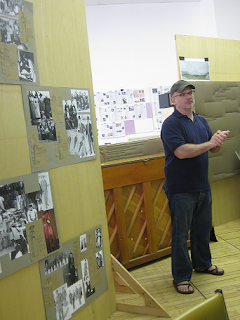“Well that was a cluster$^@&!” quips Michael Wilson, our director, after an initial pass at a particular scene in the first play. So far, we have more questions than answers. The first two of our nine plays have never been given a stage production. As a result we have been spending the majority of rehearsals helping these plays take their first steps off the page. For Michael Wilson and many others in our company, this rehearsal process sadly marks the first time that Horton Foote has not been in the room to lend his insight and clarity to the work. We halt often to interpret and clarify the subtleties in his writing. The majority of this interpretive responsibility lands on our director as well as Horton’s daughter, Hallie. Every few minutes in rehearsal these two huddle to discuss what Horton’s intentions were with a particular scene or storyline. They often consult the book containing Horton’s full-length plays, which we have affectionately begun to refer to as “the Bible,” as well as the Foote family photo albums and scrapbooks that now live in our rehearsal room.

As an actor, it is easy to feel intimidated at this point in the process. Respect and reverence for our playwright’s words can easily turn into a fear of “getting it wrong.” It is easy to forget that at this early stage there is no ‘right’ or ‘wrong’, and that any choice is better than none at all. I am told that when Horton was in the room he was always encouraged by what each particular actor brought to his plays. “It felt like he was in the trenches with us,” one actress tells me, “and he loved nothing better than watching a group of actors take a scene above and beyond where he ever imagined it in his head.” Originally an actor himself, Horton surely would have enjoyed, as I have, watching the veteran actors in our present company begin to take responsibility for more than just their parts.
In a recent rehearsal, one actor stops a scene to raise a question about a particular line: “Our best friend is dying, why am I talking about the weather?” Twenty minutes later, the entire room is engaged in a heated discussion about the subtext of a particular scene that involves two feuding families. As actors begin to side with their characters, the feuding Thornton and Robedaux families of Roots in a Parched Ground suddenly come to life: “Everything is going to shit for us! We’re talking about a quaint veneer over total chaos and panic!” I am fascinated as actors not even involved in this particular scene begin to chime in as well: “There is nothing more boring than general bullshit- the stakes are so high in these people’s lives!” Soon, the discussion of our trilogy’s first act has given way to an even greater examination of human truths: “How many people get to the end of their lives and are happy with the way things went?” Audible exhales escape from several around me. I think we all realize we’ve tapped into something essential about Horton’s plays- and all from an initial question about the weather.
Upon reflection, I am reminded of the importance of “speaking up.” Too often I think actors, especially of my generation, are afraid of what one of my teachers would call “disturbing the air” in the room. Yes, our playwright’s words are sacred, but as I learned from watching my more experienced peers today, we as a company must take ownership of what we are saying and not be fearful of disagreement. At the end of our lengthy deliberation, Michael Wilson assures us that we have not wasted our precious rehearsal time: “These are the discussions we must have- they make the play get to the center of your soul.” It’s nice to be reminded that we are not just here to say the words, but that our agency as actors is not only real, but in fact necessary.


























